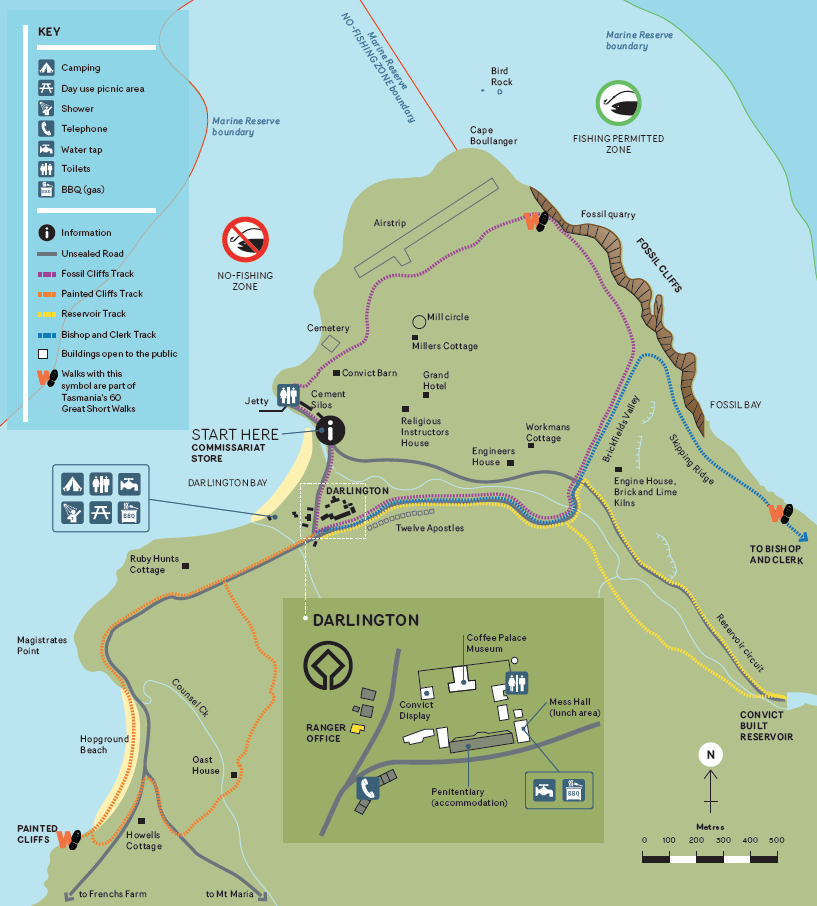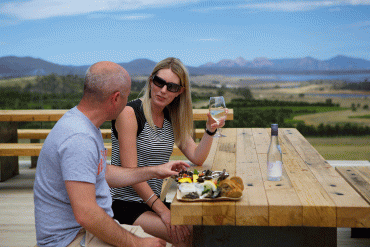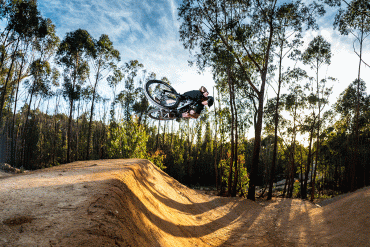Maria Island National Park is a special place, where breathtaking, wild beauty and close encounters with wildlife are everyday events. It’s a place of layered history, where wild ideas and visionary schemes have been sparked, and extinguished. And it’s a place where nature is a steadfast companion, and new adventures are everywhere to be found.
Here you can experience World Heritage-listed convict history, and discover the stories of the many people who have tried to tame Maria. You’ll climb mountains and look over blue seas, swim in crystal clear bays and walk soft, white beaches. You’ll feel nature all around you – in the touch of the sea breeze, the smell of the forest and the sight of the wildlife that is protected here. This is a wild and gentle island, a place to linger, to leave ordinary life behind, and be enchanted.
Maria Island National Park – Your adventure starts here
There are so many moods to Maria Island – it’s a wildlife haven, World Heritage-listed historic convict site, a bushwalking paradise, and it has some of the loveliest, most secluded beaches you’ll ever find. Whether you have a passion for adventure, history, wildlife, or lounging on beautiful beaches, chances are, you’ll find it on Maria Island.
There’s a lot to see here – so to help you make the most of your time on the island, we’ve put together some ideas and a few practical tips to inspire you and make sure you don’t miss a thing.
Wildlife

Forester Kangaroos at Darlington

Wombat at Darlington

Cape Barren geese at Darlington
No problem here. Maria is so full of wildlife, you’ll have a hard time missing it, whether you stay for a day, overnight, or longer.
You can encounter wildlife all across the island. Expect to see Forester kangaroos, wallabies, wombats and loads of birds, including Cape Barren geese. If you really want to see a Tasmanian devil, we recommend an overnight stay, as these little beasties are nocturnal and seldom seen during the day.
Where to see it
Anywhere on the island, but especially at Darlington, Penitentiary and Campground.
History

Commissariat Store at Darlington

Convict Barn, Darlington

Miller’s Cottage
Maria has a many-layered history – from its life as a convict probation station, to Diego Bernacchi’s prosperous vineyards and the industrial cement works of National Portland Cement Ltd.
Day trip
- Visit Darlington Probation Station—a UNESCO World Heritage-listed convict site and Australia’s most intact convict probation station.
- Walk or hire a bike to see Maria’s historic buildings and ruins. You can also bring your own bike on the ferry, see encountermaria.com.au for details.
- Visit the Commissariat Store for information about Maria Island’s history
- View the interpretive displays in Maria’s historic buildings around Darlington
Overnight or longer
- Walk to Frenchs Farm at South Maria to see the remains of the farm that was once owned by the French family.
- Visit Point Lesueur on South Maria to see the few remains of the Long Point Convict Probation Station, and the abandoned Dunbabin homestead.
Where to see it
Darlington historic township, the Coffee Palace, Convict Mess Hall, Ruby Hunt’s Cottage, Miller’s Cottage, the old cement works on the Reservoir Circuit, Frenchs Farm, Point Lesueur.
- To find locations please see this map
Views

Fossil Cliffs

Painted Cliffs

Ruby Hunt’s Cottage, Darlington

McRaes Isthmus
Like the wildlife, great views are hard to miss on Maria – they just seem to be everywhere you look. But there are a few special places that you can get to easily that will have you pulling your camera out in a hurry.
Day trip
- Walk or ride to Fossil Cliffs for spectacular views across the sea to Freycinet and Schouten Island.
- You can walk down to the base of the cliffs to see fossils embedded in the cliff face.
- Miller’s Cottage is a beautiful, convict-era brick cottage set high on a hill, that has the most stunning view across to Darlington, the fossil cliffs and the big blue sea.
- Painted Cliffs is possibly one of Maria Island’s most photographed places – for good reason. The patterns and shapes in the sandstone cliffs are caused by wind and water movement – and they will utterly entrance you.
Overnight or longer
- Explore South Maria, and see the beautiful, fragile environment of McRaes Isthmus.
- Climb Bishop and Clerk or Mt Maria for stunning views over the island and ocean.
Where to see it
Fossil Cliffs, Painted Cliffs, McRaes Isthmus, Bishop and Clerk, Mt Maria
- To find locations please see this map
Adventure

On the way to Bishop and Clerk

On the way to Frenchs Farm

The Reservoir
If you’re after a more active adventure, Maria Island National Park will not disappoint. To give yourself plenty of time to really enjoy these activities, we recommend staying overnight.
Overnight or longer
- Climb to the summit of Bishop and Clerk (11 km). This challenging walk takes you along the top of Fossil Cliffs and through the forest to the rocky slopes of the mountain. A rock scramble at the top is rewarded with incredible views.
- Climb Mount Maria (16 km) Walk through open woodland as you ascend to the ridge before tackling the rock scramble to the summit. At the top, soak up the views of the isthmus and beyond.
Beaches

Darlington Bay

Riedle Bay, McRaes Isthmus

The Painted Cliffs

Shoal Bay, McRaes Isthmus
Maria Island National Park is fringed with gorgeous beaches, pack your swimming gear and pick a beach that takes your fancy.
A morning, a day, or overnight…
- The beach in front of the campground at Darlington is an easily accessible, perfect line of white sand leading into clear turquoise waters.
- Visit stunning Shoal Bay at McRae’s Isthmus with its white sand and blue, blue water – a favourite of recent visitors, the Taylor family, which you can read about and see their adventures here.
- The water around Maria Island is a Marine Nature Reserve, and is regularly visited by seals, dolphins and whales. Go snorkelling to see the island’s abundant marine life.
- NOTE: Maria Island’s beaches are unpatrolled, so take care when swimming.
Start planning your unforgettable adventure
Now that you have some ideas and inspiration for your visit to Maria Island, here’s everything you need to know to make sure you’re prepared for your visit.
Getting to Maria Island National Park
Encounter Maria Island is the official ferry service for Maria Island National Park. The ferry departs from Triabunna Wharf, and takes about 30 minutes to reach the island. The ferry departs regularly throughout the day.
- Adult: $45.00
- Concession: $39.00 (Australian Pension Card or Health Care Card)
- Student: $28.00 (Australian Secondary Students)
- Child: $28.00 (4 to 16 years)
- Infant: Free (0 to 3 years)
*Please note – Ferry Ticket does not include National Park Entry Fees. These can be purchased online at encountermaria.com.au, parks.tas.gov.au or at the Triabunna Visitor Information Centre.
Visit encountermaria.com.au for more information, including timetables, check in, bringing your own bike and luggage restrictions.
For bus transfers to the ferry from Hobart visit https://www.mariaislandshuttle.com.au
Driving time
Triabunna is only a 1 hour 15 minute drive from Hobart’s CBD (86 km), and just 68 minutes’ drive from Hobart airport. Depending on your flight arrival time, you could potentially be stepping off the ferry at Maria Island within a few hours of arriving in Tasmania! If you’re travelling from Launceston, allow around two and a half hours (186 km) to drive to Triabunna.
Facilities
There are no shops, cafés or hotels on Maria Island so it’s a good idea to bring enough water, food and snacks for your stay. You can find information about the island in the Commissariat Store – the oldest building on the island, located just near the jetty. You’ll find free gas barbecues, open fireplaces and picnic tables in the picnic shelter, close to the beach near Darlington. Coin operated hot showers and toilets are also located here. If you’re planning to stay on the island for a few days, trolleys are also available to help transport your gear. Mobile phone coverage is limited, but really, the best use for your phone here is to take some spectacular photos!
Transport
Apart from Parks and Wildlife Service (PWS) ranger vehicles, no cars are permitted on Maria Island. So come prepared to do some walking, or hire a bike to explore the island.
Bike hire
Maria is a great place to explore by bike. Fully equipped MONTARI trail bikes are available for hire on the island – book at least 24 hours before your ferry departure by calling (03) 6256 4772. Collect your bike from the hire depot next to the Penitentiary when you arrive, and you’re on your way.
You can ride on the Island’s roads and tracks, and over some open paddocks. Bike hire is $33 per day for each adult and $20 per day for children. If you’d prefer to take your own bike, you can bring it with you on the ferry. Visit encountermaria.com.au for more information.
Stay
Some of Maria’s best adventures need a little longer than a day to really enjoy. Stay for a night or two in the Penitentiary, or camp at Darlington, French’s Farm or Encampment Cove, and start your own adventure.
Basic, bunkroom accommodation is available at the Penitentiary at Darlington, and must be booked in advance by calling the Triabunna Visitor Information Centre on 03 6256 4772, or email [email protected] or book online here.
There is a large campground with BBQ shelters and shower/toilet facilities at Darlington. There’s no need to book your campsite, but camping fees do apply. Free camping is also available at Encampment Cove and French’s Farm (2-4 hours walk from Darlington).
What to bring
There are no shops on Maria, and limited drinking water, so make sure you bring enough water and food for your stay.
Much of your time on Maria Island will be spent out in the open, and the weather can be changeable. Check the forecast before you travel and come prepared for the conditions. Pack your swimming gear, sun and rain protection, and wear layers of clothing suitable for warm and cold conditions. Comfortable walking shoes or boots are essential.
Water
Water is precious on Maria Island. Drinking water is available from the mess hall at Darlington, and all other water is supplied from rainwater tanks at Darlington, Frenchman’s farm and Encampment Cove. It’s recommended that you treat the water before drinking. Bringing your own water is a good idea.
Walks (and rides)
There are several fantastic short walks and day walks on Maria, many of which can also be done by bike.
Find out more about …
- Important information when travelling to Maria Island
- Maria Island Wildlife
- Frenchs Farm, Point Lesueur and Dunbabin homestead
- Historic Darlington
- Fossil Cliffs
- Painted Cliffs
- McRaes Isthmus
- Bishop and Clerk
- Mt Maria
- Cycling around Maria Island
- Read a short history on Maria Island
- Read about the Taylors Best Day Trip Ever
Maria Island Map




